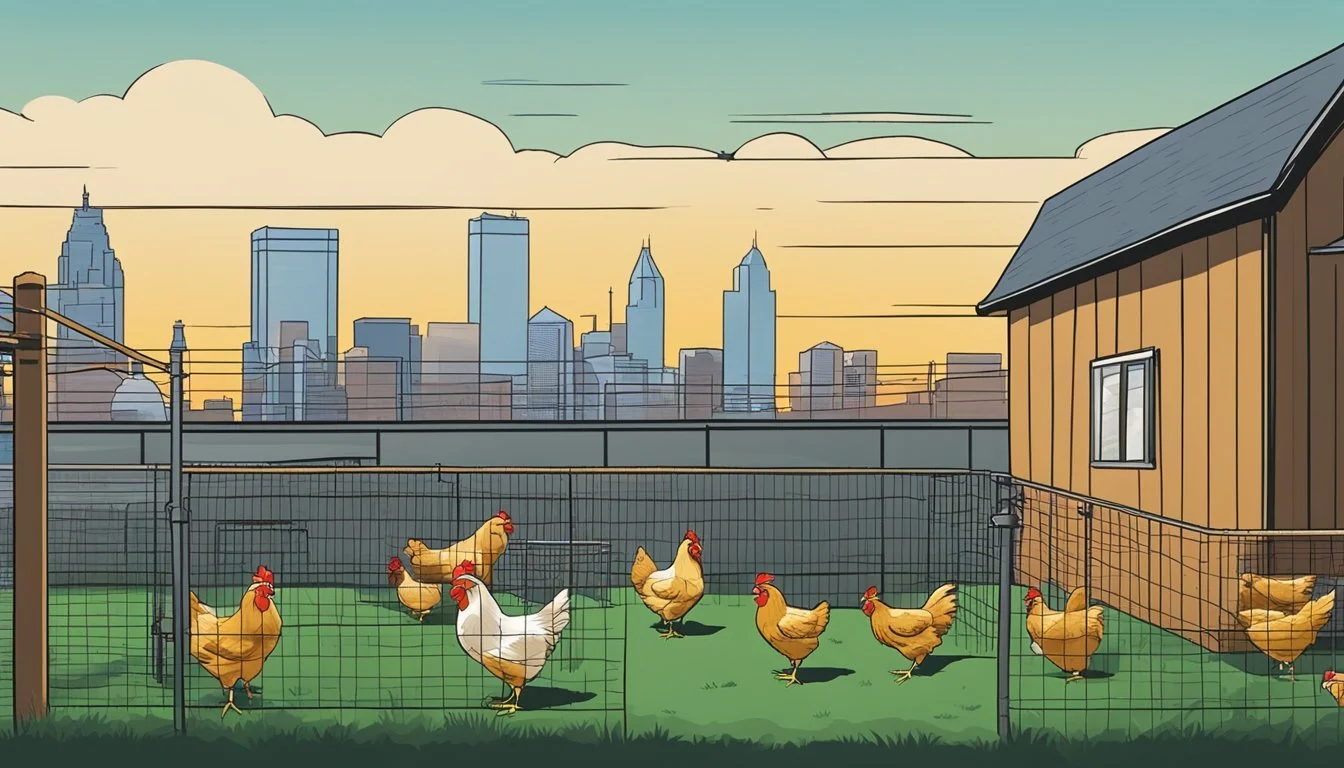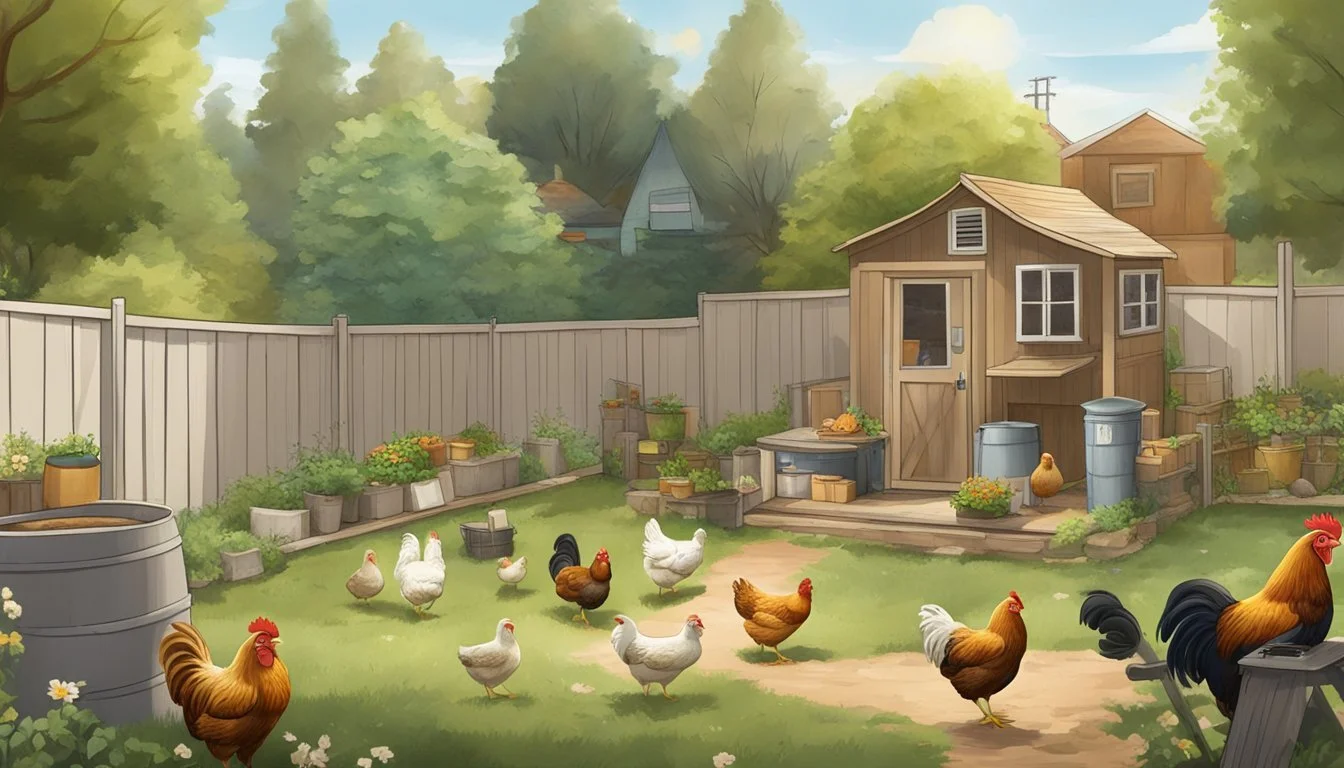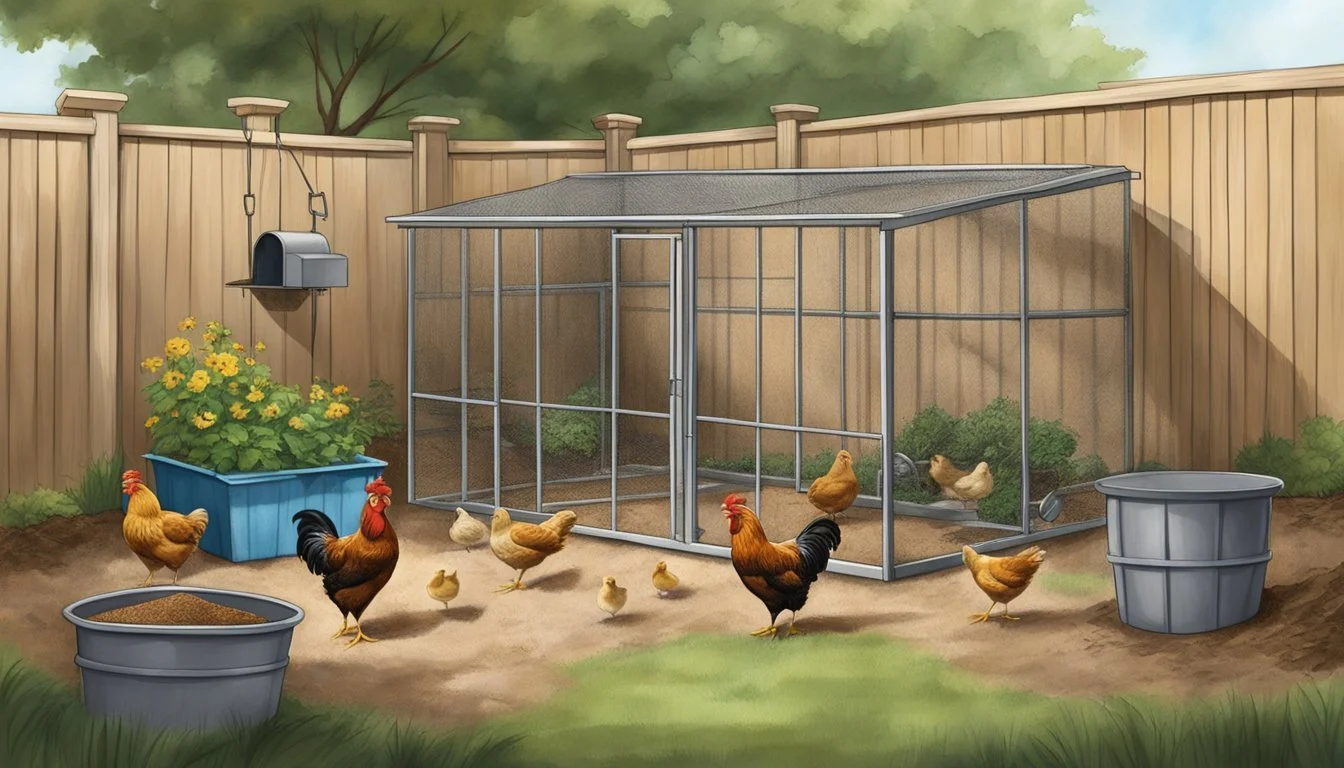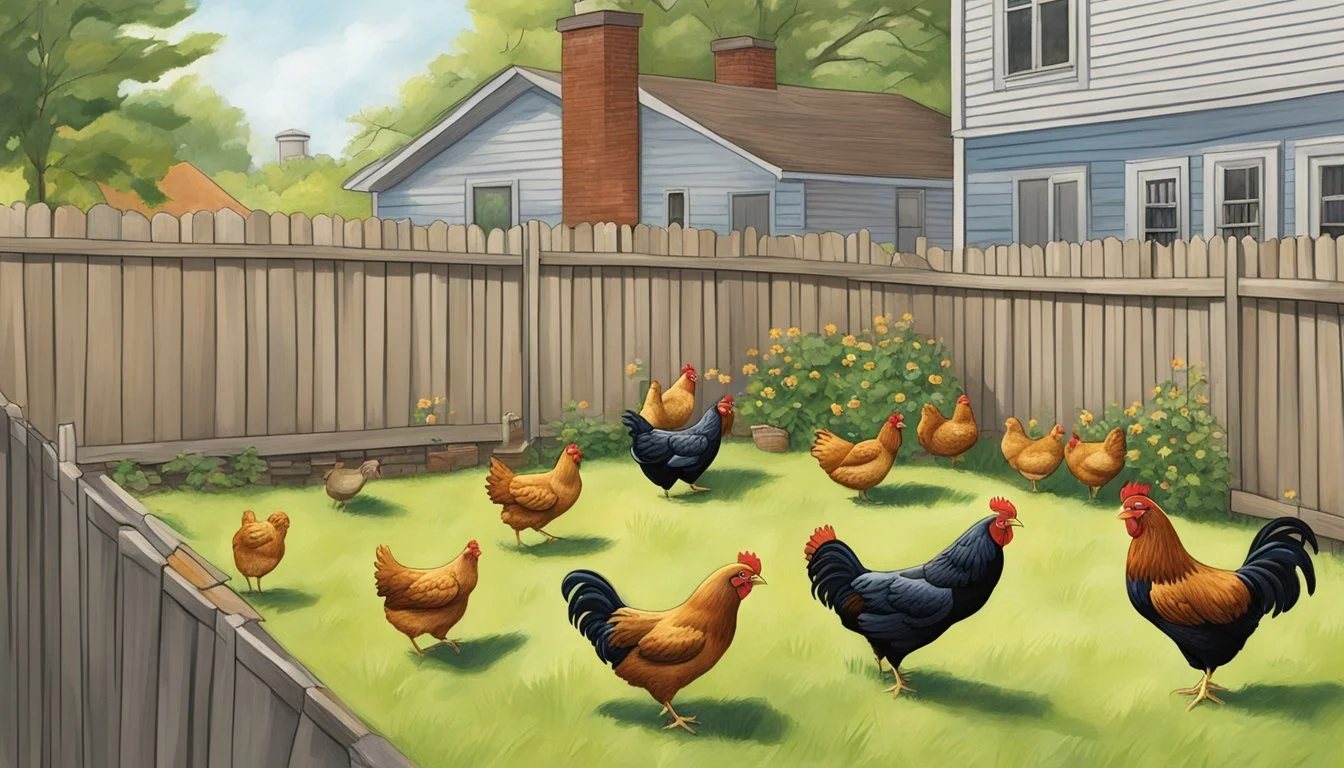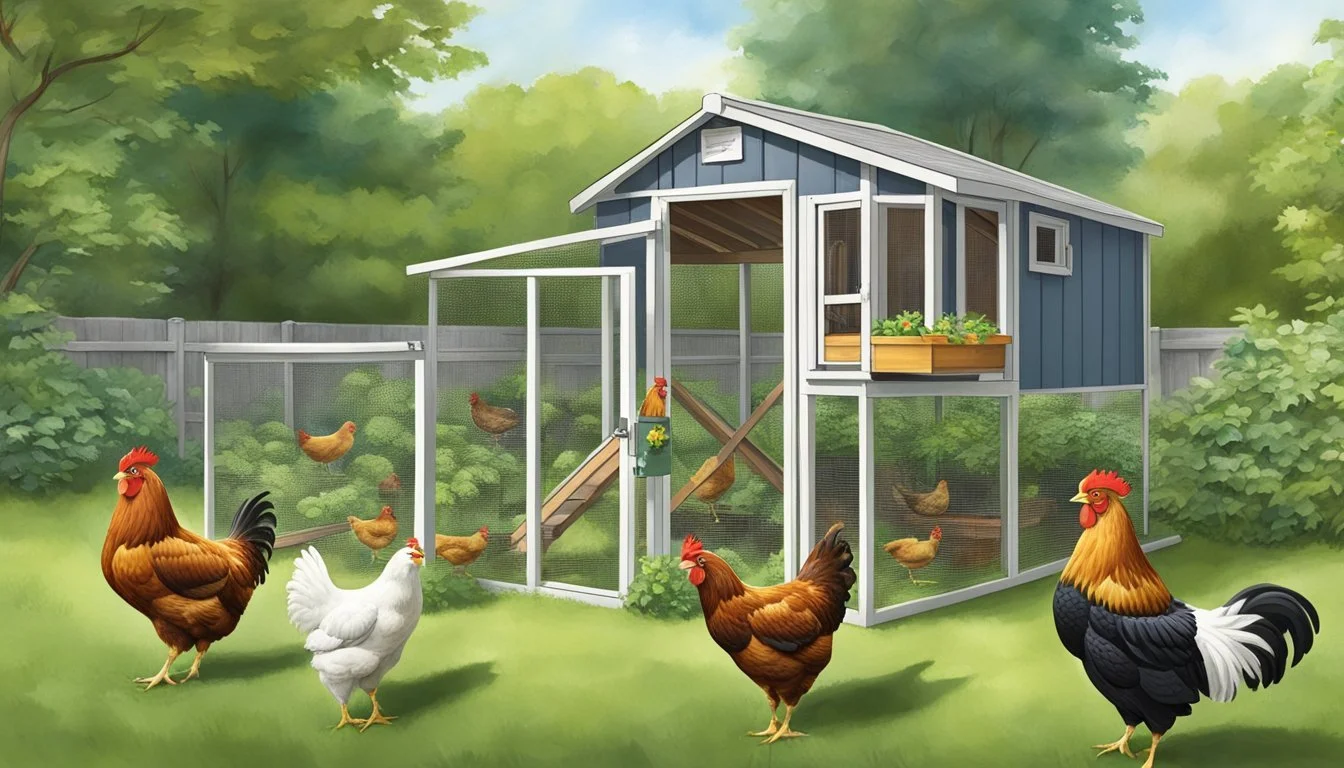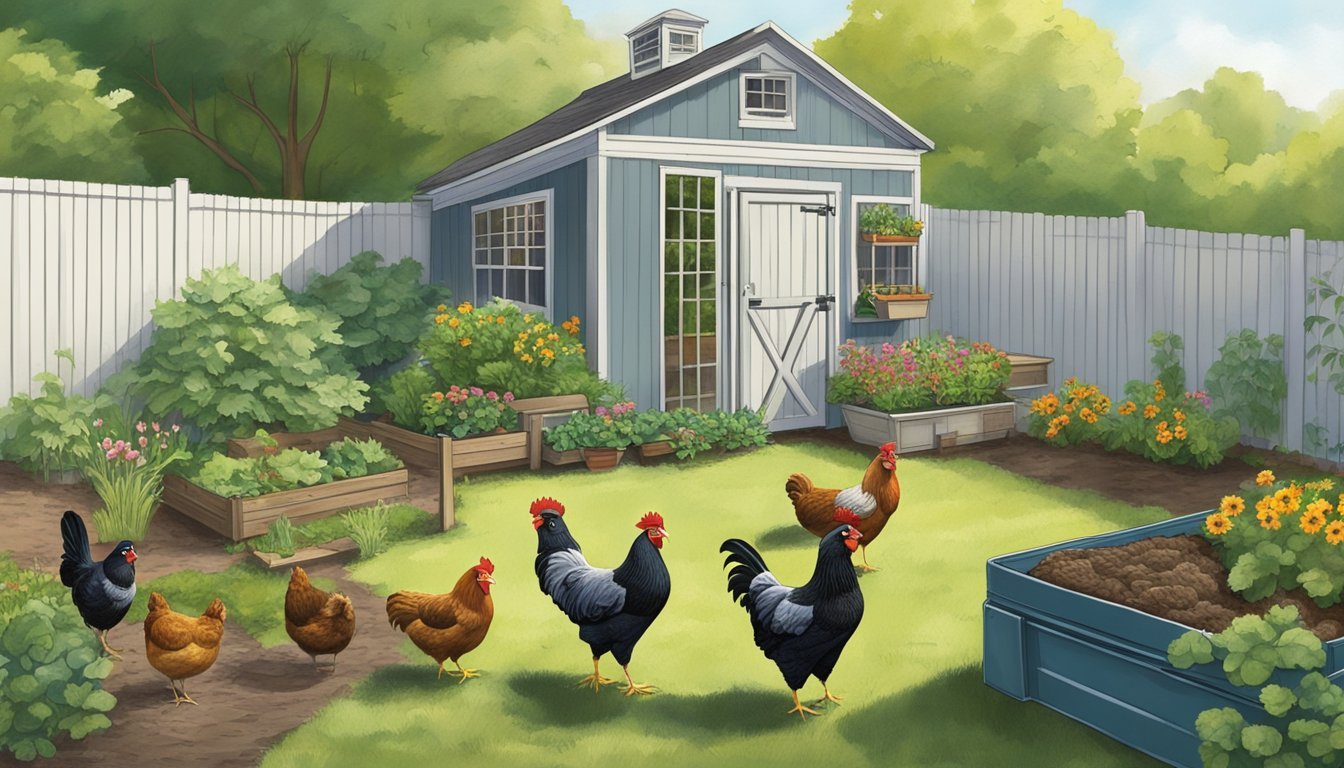Keeping Backyard Chickens in Pittsburgh, PA
Essential Guidelines for Urban Poultry Farming
The urban landscape of Pittsburgh, Pennsylvania, offers a unique opportunity for residents to engage in small-scale, sustainable agriculture right in their own backyards. Among the various urban agricultural practices, the keeping of backyard chickens (how long does chicken last?) is a growing trend in the city. This is a reflection of a larger movement towards local food production and self-sufficiency that has been gaining momentum across urban environments.
Interested individuals in Pittsburgh can keep up to five chickens on a minimum of 2,000 square feet of land, a space requirement that includes the footprint of one's home. This regulation ensures that there is adequate space for these birds to thrive without causing disruption to the surrounding neighborhood. Furthermore, the local zoning code provisions clearly articulate that while chickens are permissible, other poultry such as geese and ducks must be regulated to avoid issues such as wandering fowl or noise disturbances.
The reasons for raising chickens in such an urban setting are multifaceted. Apart from providing a source of fresh eggs, chickens also contribute to garden health by consuming pests and providing nutrient-rich manure. For residents of Pittsburgh, engaging with city-defined regulations is essential, as these guidelines are designed to maintain a balance between urban living and agricultural endeavors, ensuring the well-being of both the chickens and the community at large.
Legal Considerations for Raising Chickens
Raising backyard chickens in Pittsburgh requires understanding the city's specific ordinances, zoning regulations, and permit requirements. Adhering to these rules is essential for lawful poultry keeping.
Understanding Pittsburgh's Chicken Ordinance
In Pittsburgh, the City's Chicken Ordinance regulates the keeping of chickens on residential property. Key points from the ordinance include:
Lot Size Requirement: A minimum of 2000 square feet is required to keep chickens.
Fowl Limit: Residents can keep up to 5 chickens on the minimum-sized lot.
Additional Chickens: For each additional 1000 square feet of property, one may keep one additional chicken.
Zoning Regulations and Property Lines
Zoning regulations in Pittsburgh ensure that chicken coops and runs are kept in appropriate locations on one's property relative to neighboring homes. Key zoning requirements to note:
Setbacks: Coops must be maintained a certain distance from property lines and neighboring dwellings, to reduce nuisance and maintain community standards.
Residential Zones: While most residential areas permit chickens, some may have stricter regulations or even prohibit them, hence checking local zoning codes is crucial.
Permit Requirements for Poultry Keepers
The City of Pittsburgh may require poultry keepers to obtain a permit for legally keeping chickens. Permit requirements may include:
Application: Submitting an application detailing your plan for keeping chickens.
Fees: Payment of a fee, which varies depending on the number of chickens and the size of the property.
Inspection: An inspection of your premises may be required to ensure compliance with the chicken ordinance and zoning regulations.
Compliance with the City of Pittsburgh’s and overall Pennsylvania chicken ordinances is non-negotiable for the lawful keeping of backyard poultry. Residents must be mindful of not only the city but also the state-level regulations that may impact their chicken-keeping practices.
Setting Up Your Chicken Coop
When setting up a chicken coop in Pittsburgh, it's essential to consider design, size, security, and maintenance. A properly designed coop ensures the health and safety of the chickens while also minimizing odor and waste issues.
Coop Design and Size
The coop should provide a minimum of 2 square feet per chicken, allowing for adequate space to move, roost, and feed. It should also be sturdy and well-ventilated to protect the chickens from the elements while keeping the air fresh. Below are key design features for an adequate chicken coop:
Ventilation: Ensure proper airflow with vents or windows.
Nesting boxes: One box for every three hens is recommended.
Perches: Provide a comfortable roosting spot, spaced to prevent overcrowding.
Accessibility: Include doors or openings for cleaning and egg collection.
Protection from Predators
Chickens are vulnerable to predators, including foxes, raccoons, and birds of prey. Implementing protective measures can reduce the risk of attacks. Essential security features include:
Fencing: Use hardware cloth instead of chicken wire to safeguard against smaller predators.
Secure Latches: Raccoons can open simple catches, so use locks or carabiner clips.
Roof Cover: Protect chickens from aerial predators with a solid or wired roof.
Managing Odor and Waste
Odor control and waste management are crucial for maintaining a healthy and neighbor-friendly coop environment. These practices help:
Regular Cleaning: Clean the coop and change bedding regularly to prevent odor buildup.
Proper Disposal: Manage waste by composting or following city regulations for disposal.
Dry Bedding: Keep bedding dry to mitigate odor; consider using straw or wood shavings.
By addressing these key aspects, one can establish a clean, secure, and comfortable environment for backyard chickens in Pittsburgh, PA.
Chicken Care and Management
Proper care and management are essential for the health and productivity of backyard chickens in Pittsburgh. From nutrition to health monitoring, every aspect holds significance for the well-being of the poultry.
Feeding and Nutrition
Chickens require a balanced diet to maintain their health and to produce quality eggs. A typical chicken diet consists of:
Layer pellets: Formulated to provide all the necessary nutrients for egg-laying hens.
Grit: Helps in the digestion process, as chickens do not have teeth.
Calcium supplements: Such as oyster shell, to ensure strong eggshells.
Treats such as scraps, fruits, and vegetables can be given in moderation but should not exceed 10% of the chicken's diet.
Water Supply and Cleanliness
Water is vital for chickens, and they should have access to clean water at all times. The waterers must be:
Cleaned regularly to prevent the buildup of algae and bacteria.
Refilled daily with fresh water.
Protected in winter to prevent freezing.
Maintaining a routine to check and refill water containers ensures chickens stay hydrated and healthy.
Daily Health Checks
Conducting examinations on chickens regularly is essential for early identification of health concerns. Owners should check for:
Physical signs: Such as changes in eating habits, abnormal droppings, or lethargy.
Parasites: Regular inspections for lice, mites, and other pests that can affect the chickens' health.
Any sudden changes in behavior or appearance may indicate illness and should prompt immediate attention from the owner or a veterinarian experienced with poultry.
Understanding Animal Behavior
In managing backyard chickens in Pittsburgh, it’s essential to comprehend their social habits and interactions with other animals. This understanding ensures a harmonious and healthy backyard habitat.
Social Structure of Chickens
Chickens display a hierarchical social structure called a "pecking order." This system determines their access to resources like food and nesting spots. The alpha rooster usually stands at the top, followed by dominant hens. Subordinate chickens are lower in the hierarchy. Observing their interactions can help owners identify any disruptions in the pecking order, which might require intervention to prevent bullying and stress among the flock.
Interaction with Other Backyard Animals
Chickens can coexist with other domestic animals like ducks, but careful introductions and monitoring are key to peaceful encounters. Crucial considerations include:
Separation: Keeping different species in separate but adjacent spaces can help acclimate them to each other's presence safely.
Supervision: Initial interactions should be closely supervised to prevent aggressive behavior.
Resource Availability: Ensure ample food, water, and shelter to reduce competition between species.
Chickens and ducks generally have different needs and behaviors, and while they may live together, they don't typically interact as members of the same social group. Instead, they form separate hierarchies and should have their distinct areas within the backyard to fulfill their species-specific behaviors.
Neighborhood Relations
Keeping backyard chickens in Pittsburgh requires careful consideration of neighborhood dynamics. Maintaining good relations with neighbors involves understanding and adhering to regulations, managing potential disturbances, and recognizing the communal benefits of urban agriculture.
Rooster Restrictions
In Pittsburgh, urban agriculture zoning codes do not generally allow roosters due to their potential to cause noise disturbances. This restriction helps minimize the likelihood of conflicts with neighbors and ensures a more peaceful environment.
Managing Noise and Neighbor's Concerns
To responsibly keep chickens within city limits, it is crucial to:
Contain noise: Chickens can be noisy, so coop placement should be strategic, away from neighboring properties.
Address concerns proactively: Regular communication with neighbors can preempt complaints and foster understanding.
By being considerate, poultry owners can prevent noise issues from hatching into bigger problems.
Benefits of Urban Agriculture
Urban agriculture, including chicken keeping, offers several benefits, which can be a point of community pride:
Educational opportunities: It promotes knowledge about food sources.
Sustainability: Keeping chickens contributes to local food production and can reduce carbon footprints.
Sharing these benefits can help neighbors appreciate the value of urban agriculture, leading to a supportive and cohesive community.
Other Considerations
When keeping backyard chickens in Pittsburgh, a thoughtful approach is needed to address potential challenges. Two critical areas for attention are managing predators and pests and ensuring harmony when keeping chickens alongside other livestock.
Dealing with Predators and Pests
Chickens attract various predators, which can include foxes, raccoons, hawks, and even domestic dogs. Effective strategies for safeguarding the flock involve:
Secure Housing: Nighttime housing should be fortified with hardware cloth instead of chicken wire to prevent predators from reaching in.
Fencing: A solid fence that extends underground can deter digging predators, while an overhead net can protect against birds of prey.
Cleanliness: Regularly cleaning the coop and securely storing feed can help minimize attracting rodents or other pests that can invade nests and spread disease.
Pests such as mites, lice, and ticks are also a concern, and owners should establish a routine for coop maintenance and chicken health checks to quickly identify and address such issues.
Keeping Chickens Alongside Other Livestock
It is feasible to keep chickens alongside other small livestock such as ducks and goats, but mindful management is crucial for harmonious coexistence:
Separate Spaces: While chickens can roam freely with other animals during the day, separate sleeping quarters are advisable.
Disease Control: Monitoring for signs of illness and maintaining a vaccination schedule is important, especially as some diseases can transfer between livestock.
Food and Water: Ensure that chickens and other animals have access to their own food and water sources that meet their respective dietary needs.
Supplementary Activities
Keeping backyard chickens in Pittsburgh not only provides fresh eggs but also yields two significant by-products: nutrient-rich manure for gardens and the potential for egg-related activities. These supplementary activities enhance sustainability and contribute to a more circular backyard ecosystem.
Egg Production and Usage
Backyard chicken owners can expect a regular supply of eggs, which vary based on the breed of chicken. For instance, the Plymouth Rock or Rhode Island Red breeds average about 5-6 eggs per week. Fresh eggs can be used daily for cooking and baking, but they also present opportunities for selling or bartering within the community. To ensure food safety, it’s important to collect eggs frequently and store them properly at a temperature below 45°F.
Collecting eggs early in the day.
Cleaning eggs with fine sandpaper, a brush, or a cloth.
Storing eggs in a cool, dry place, ideally in a refrigerator.
Using Chicken Manure as Fertilizer
Chicken manure is a valuable source of fertilizer for gardens. Its high nitrogen, phosphorus, and potassium content are essential for healthy plant growth. Before using the manure, it's crucial to compost it properly to avoid the spread of pathogens and to reduce the potential for burning plants with the high nitrogen content.
Composting chicken manure for at least 6 months.
Applying compost to vegetable gardens or flower beds to improve soil health.
Monitoring plant response to adjust the amount of fertilizer accordingly.
Additional Resources
For individuals pursuing the endeavor of keeping backyard chickens in Pittsburgh, it’s essential to engage with local resources for practical experiences and community knowledge.
Visiting Local Farms
Individuals interested in keeping chickens can gain hands-on experience by visiting local farms in the area. This can be a valuable opportunity to observe chicken care practices first-hand. Farms in regions like Erie and Lancaster, known for their agricultural richness, are ideal for such visits. They can contact these farms to schedule a visit:
Erie Family Farm: Tours available upon request.
Lancaster Poultry Retreat: Offers workshops and scheduled visits.
Learning from Chicken Enthusiast Communities
Connecting with chicken enthusiast communities provides an avenue for support and advice. These communities often share knowledge about state regulations, best practices, and can help newcomers navigate the nuances of urban chicken keeping. Useful resources include:
Pittsburgh Pro-Poultry People: A local group offering FAQs and community support.
BackYard Chickens - Pittsburgh Chapter: Online forums and local meetups for discussing poultry-related issues.
Those interested in learning more about chicken keeping can also visit the City of Pittsburgh; Animal Services for additional guidance and information on municipal ordinances.
Regulatory Updates
As of October 28, 2023, aspiring and current backyard chicken owners in Pittsburgh must comply with the latest ordinance updates. It is essential for residents to contact local officials to confirm the current regulations, as these can change periodically.
Recent changes have streamlined the process for obtaining chicken permits. Pittsburgh City Council members have eliminated the previous requirements, which included public hearings and a payment of a $350 permit fee. These adjustments have made it easier and more affordable for homeowners to maintain backyard chickens.
Key Regulations:
Permit Application: Simplified process; no public hearing required.
Fee: Significant reduction from the earlier $350.
For detailed information, individuals should refer to the specific City of Pittsburgh’s codes on ownership and maintenance of poultry:
Fowl at Large: Ordinance § 635.02 prohibits owners from allowing chickens to roam off their property.
Those interested in the welfare of their fowl and neighborhood harmony should be aware of other stipulations, such as coop placement, noise control, and manure management, which are pivotal to maintaining local water quality and community standards.
Prospective chicken keepers are advised to keep abreast of any changes to ensure they remain compliant with Pittsburgh’s chicken laws.

